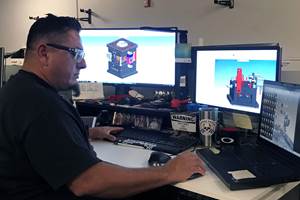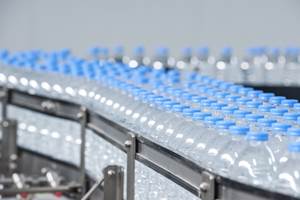Understanding the New Flow Through Deduction
The qualified business income deduction of the Tax Cuts and Jobs Act gives mold shops a 20-percent deduction of qualified business income to all non-corporate taxpayers, but it comes with some qualifications, restrictions, and limitations.
Share
Read Next
The qualified business income deduction of the 2017 Tax Cuts, and Jobs Act (The Act) offers a 20-percent deduction to shops for tax years ending in 2018 and expires December 31, 2025. The law appears to be simple. It gives mold shops a 20-percent deduction of qualified business income to all non-corporate taxpayers (flow-through entities, S corporations, partnerships and LLCs). However, it comes with some qualifications, restrictions and limitations.
Relevant Passthrough Entity (RPE)
The regulations specify that a shop must be a relevant passthrough entity (RPE) to be considered for the deduction. RPEs include partnerships, S corporations, sole proprietorships, businesses operated through trusts and estates and some businesses with rental activities. As such, mold shop owners must consider this deduction for all of its flow-through entities, not just the tooling operations. For example, a taxpayer that owns his shop and rents it to the operating entity may also be able to benefit from this deduction.
For an activity to be an RPE, it must rise to the level of a trade or business, regardless of the entity’s structure. However, there is no clear definition of a trade or business, so a shop must rely on the tax code (generally §162) and support from court cases to evaluate each RPE.
These rules can be complicated, so the IRS is releasing more information by the end of 2019. However, mold shops should use existing guidance to determine the appropriate §199A for the tax year 2018.
Specified Service Trade or Business (SSTB)
A shop must also determine if each RPE is a Specified Service Trade or Business (SSTB), which is defined as the following according to §199A: “Any trade or business involving the performance of services in the fields of health, law, accounting, actuarial science, performing arts, consulting, athletics, financial services, brokerage services, or any trade or business where the principal asset of such trade or business is the reputation or skill of one or more of its employees or owners, or which involves the performance of services that consist of investing and investment management trading, or dealing in securities, partnership interests or commodities.”
Engineers, architects, real estate brokers, property managers and some banks are among those specifically excluded from the list. Initially, there were concerns about businesses that rely on employee reputations or skills, which means a mold shop could be disallowed the deduction because of their reliance on their reputation as a moldmaker. This was tightened up significantly in the proposed regulations to include only people who receive endorsement income, appearance fees or license their individual likeness. As such, mold shops should not fall under the definition of an SSTB.
Additional guidance is available for businesses that share common ownership with SSTBs, de minimis SSTB income and incidental non-SSTB income. Mold shops will need to consider whether they do any non-engineering consulting or whether any of their ancillary services meet the definition of an SSTB.
Qualified Business Income
Next, a shop calculates the Qualified Business Income (QBI) for each RPE. This calculation includes domestic income, expenses, gains, losses and deductions connected to the qualified trade or business with any shared expenses. Conversely, capital gains and losses (even if related to business property), foreign income, portfolio income and annuities not associated with the business are excluded from QBI.
Self-rental income is included in QBI if the paying entity is a qualified trade or business that is not an SSTB and which is held under common control. Reasonable wages for S corporation shareholders are not added to QBI. And, if an S corporation mold shop pays no reasonable wages, an amount of reasonable compensation must be excluded from income to determine QBI. For mold shops taxed as partnerships, guaranteed payments received are not QBI, and there is no reasonable guaranteed payment test.
The law appears to be simple. It gives mold shops a 20-percent deduction of qualified business income to all non-corporate taxpayers (flow-through entities, S corporations, partnerships and LLCs). However, it comes with some qualifications, restrictions and limitations.
Deduction Calculation
All QBI amounts are aggregated to determine if the net amount is positive. If it is negative, the amount is carried forward to offset future year QBI, but the shop cannot take a QBI deduction in the current year. If it is positive, any negative amounts are allocated pro rata over the positive amounts. If a mold shop owner has interests in Real Estate Investment Trusts (REITs) or Publicly Traded Partnerships (PTPs), the dividends and income, respectively, are also eligible for a 20-percent deduction, but these amounts are kept separate and not netted against other QBI amounts.
Limitations
The deduction is calculated at the shareholder or partner level using the information provided by the RPE, including classification as an SSTB, the amount of qualified wages and the unadjusted basis immediately after acquisition (UBIA) of the related assets. The deduction is subject to a wage and property limit that is equal to the greater of 50 percent of the shop’s W-2 wages, and the sum of 25 percent of the shop’s W-2 wages plus 2.5 percent of the Unadjusted Basis Immediately after Acquiring (UBIA) qualified property.
How the taxpayer uses this information depends on the taxpayer’s Adjusted Gross Income (AGI), as shown in the chart.
Qualified Wages
If the shop has non-SSTB income and AGI is over the threshold, wages and possibly UBIA should be considered to determine whether a limitation applies. Qualified wages are those wages allocated to the qualified business income. The total includes wages, elective deferrals, deferred compensation and designated ROTH contributions. A shop can consider wages even if they pay them through a Professional Employer Organization (PEO) or similar arrangement.
UBIA Calculation
Qualified property must be tangible, depreciable property the mold shop uses in the production of QBI. Bonus depreciation, §179 or an election to use the Alternative Depreciation System (ADS) do not impact the asset’s basis or life.
UBIA of the property is generally the basis of the property at the date the shop places it into service. A shop can include property in the equation for the longer of 10 years or the regular depreciable life. However, depreciation cannot end before year-end, and the shop cannot dispose of the asset before the year-end.
After a shop determines the total QBI deduction, the QBI and REIT/PTP deductions are combined and subjected to one last test. The deduction is limited to the lesser of the calculated QBI deduction or 20-percent of the shop’s taxable income, less any capital gains.
These rules can be complicated, so the IRS is releasing more information by the end of 2019. However, mold shops should use existing guidance to determine the appropriate §199A for the tax year 2018.
About the Author
Douglas M. Mueller, CPA is president and Michael J. Devereux II, CPA, CMP is a partner and director of manufacturing, distribution and plastics industry services of Mueller Prost.
For More Information
Mueller Prost / 314-862-2070 / mdevereux@muellerprost.com / muellerprost.com
Related Content
Mold Design Review: The Complete Checklist
Gerardo (Jerry) Miranda III, former global tooling manager for Oakley sunglasses, reshares his complete mold design checklist, an essential part of the product time and cost-to-market process.
Read MoreWhat is Driving Mold Lifecycle Management Digitalization?
OEMs are looking to partner with suppliers to share and track data across the supply chain for advanced intervention and process management.
Read MoreEditorial Guidelines: Editorial Advisory Board
The Editorial Advisory Board of MoldMaking Technology is made up of authorities with expertise within their respective business, industry, technology and profession. Their role is to advise on timely issues, trends, advances in the field, offer editorial thought and direction, review and comment on specific articles and generally act as a sounding board and a conscience for the publication.
Read MoreMaking Quick and Easy Kaizen Work for Your Shop
Within each person is unlimited creative potential to improve shop operations.
Read MoreRead Next
How to Use Continuing Education to Remain Competitive in Moldmaking
Continued training helps moldmakers make tooling decisions and properly use the latest cutting tool to efficiently machine high-quality molds.
Read MoreHow to Use Strategic Planning Tools, Data to Manage the Human Side of Business
Q&A with Marion Wells, MMT EAB member and founder of Human Asset Management.
Read MoreAre You a Moldmaker Considering 3D Printing? Consider the 3D Printing Workshop at NPE2024
Presentations will cover 3D printing for mold tooling, material innovation, product development, bridge production and full-scale, high-volume additive manufacturing.
Read More




















